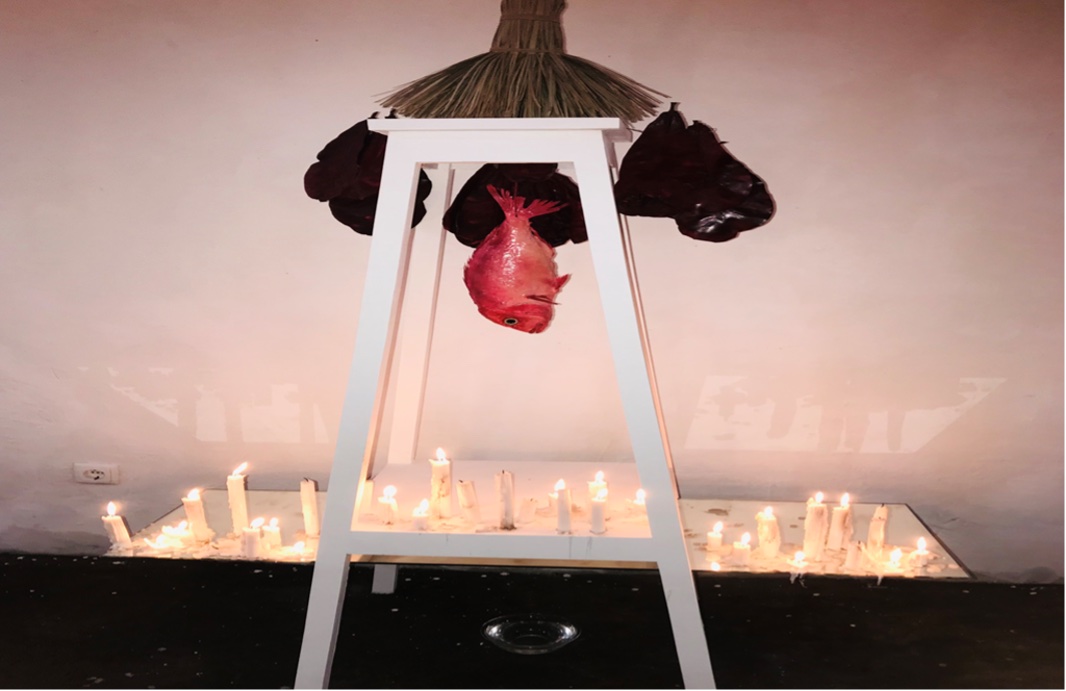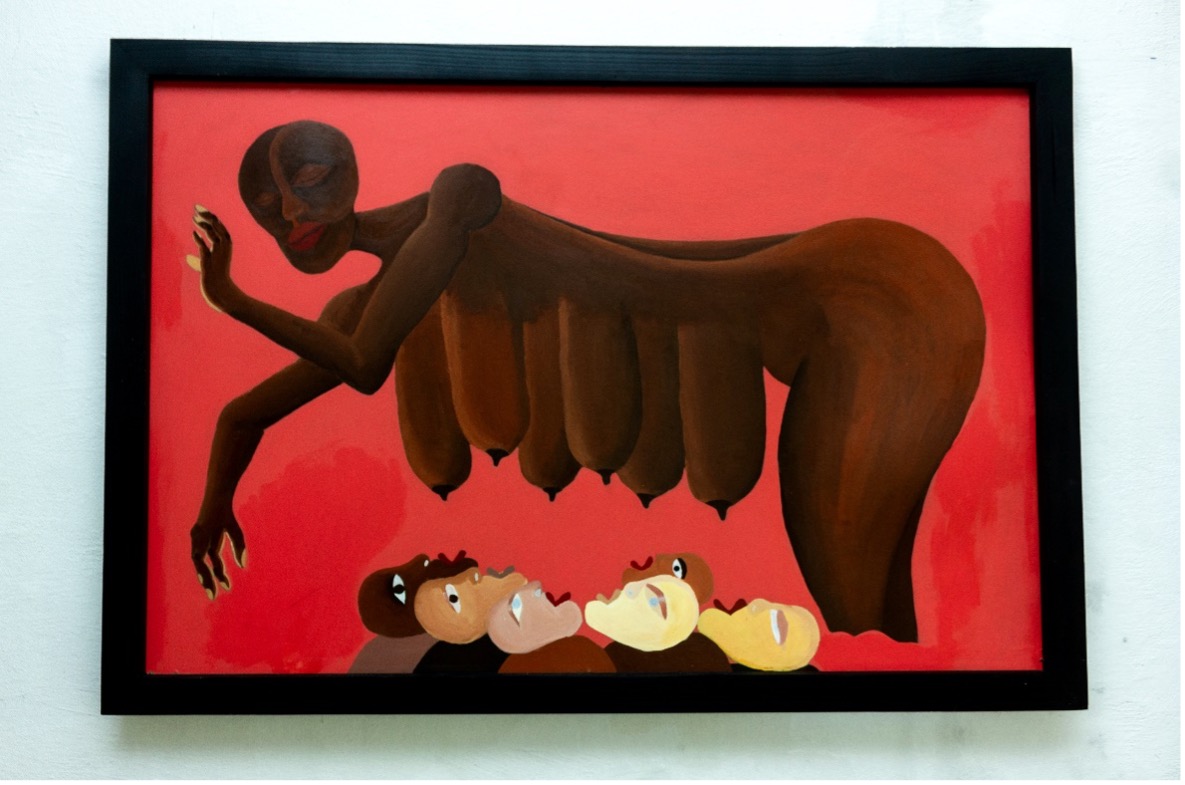Curators Onyịnye Alheri and Carolina Policarpo display collaborations between artists from Mozambique, Nigeria, and Angola.

Marilú Mapengo Námoda, What does the silence pray for? / Para que reza o silencio?, 2023, Sculpture, 2m x .5m. Photo: Lorna Zita
Drenched in light and spirituality, the cultural space Sabura in Maputo challenges attendees to see artworks without preconceptions. The exhibition Sem Sombras (Unshadowed) brought together queer artists and the most diverse art forms in a single space. It granted the public the opportunity to get to know the artists’ oeuvres as well as certain narratives which may have been new to them.
Curator Onyịnye Alheri is a board member of Communities United, an organization that builds leadership and fights racism, poverty, and war. The title of this exhibition, co-curated with Carolina Policarpo, emerged from within queer communities – from a need to show the world how queer artists want others to perceive them and, above all, respect them. The exhibition reclaims queer pride and visibility through poetry, painting, music, and performance art by Eliana N’Zualo, Géssica Stagno, Yuck Miranda, Ana “Yak” Machava, Marilú Mapengo Námoda, Amina Gimba, and Pamina Sebastião. The curatorial process for the project took almost a year because Onyịnye and Policarpo wanted to bring it to Mozambique’s many provinces. They believe that displaying these artists’ perspectives is an essential way to reach people, and that it will contribute to people’s access to information around queer experiences.

Yaki (Ana Raquel Machava), Sem título, 2. Acrylic on canvas, 120 cm x 80 cm (each). Photo: Lorna Zita
Connecting natural and spiritual beings, the works of Ana Machava emphasize the struggle of queer women and their need for safer spaces. In her photographs colors are used to frame nature as the essence of human existence and divinity that is woman. The photographs are taken from multiple angles and capture the neutral facial expressions of those living and reuniting with other beings.
Géssica Stagno presents viewers with an assertive play of strong, vibrant colors to portray the journey of a being who frees themself of fear and through those strong tones seeks acceptance and a place of belonging. Combining oil and acrylic paint, Stagno establishes the narrative through a holistic perspective, bringing several emotions to a single image: pain, joy, and love.
Yuck Miranda starred in an epic performance: Zita. They played the character Zita, who conveys pains that people from LGBTQIA communities confront daily. Miranda placed great emphasis in their performance on the violence people face by coming out as “different” from what is accepted by society. A mix of music, theater, and song, the performance reflects the violence of relatives who believe that LGBTQIA people do not deserve respect, resulting in a person receiving insults throughout their life.
In other corners of the space, viewers could connect to headsets and listen to the poetic performance of Eliana N’Zualo in the film Love Letters for Badly Behaved Girls. Shown on a screen, it combined music and poetry to tell the stories of fearless women who envision and raise other women and abhor violence.
The multiple perspectives of the exhibition allow for diverse and pertinent, expansive and eye-opening readings as confrontations are established. Embracing art as a means of communication is to uphold the objective of generating reflection, focusing on the relationships that can be established within the most varied disciplines of a specific field. This exhibition demonstrates the potential of various art forms coexisting in the same space, one complementing the other. Although each of them has its own way of establishing its narratives and showing its perspectives on things, the hopeful vision that the artists collectively convey is that of a tolerant world, one that is without violence and based on mutual respect.
According to Afrobarometer in 2016, a non-governmental organization founded in 1999 to collect statistical data from over thirty-five countries in Africa, Mozambique is one of the ten most tolerant countries toward homosexuality. But clearly that is not enough: people from LGBTQIA communities continue to face violence and prejudice. Just to give you an idea, the legal criminalization of homosexuality was only revised in 2014. That’s to say, there is still much to be done to guarantee the protection and rights of queer communities.
LAMBDA – the Mozambican Association for the Defense of Sexual Minorities, one of the largest organizations fighting for the protection and rights of queer people in Mozambique, has highlighted the main issues the community faces. Most notably, these are societal stigma and hindered access to healthcare, education, and employment. LAMBDA diretor Roberto Paulo points out how unsettling this finding is, considering that every human being should have the right to choose how they want to live without fear of social exclusion.
As psychoanalyst Joyce McDougall wrote: “every human being has the right to belong to both sexes, nurturing the fantasy of sexually possessing and simultaneously identifying with men and women.” To guarantee this equality we need to create public policies that aim to combat discrimination of all kinds, increase the participation of minorities in political processes around access to education and employment, and correct all forms of inequality, prejudice based on origin, race, sex, color, age, and any other form of discrimination. This is the perspective that the queer artists brought to Sem Sombras.
Sem Sombras was the winner of an international call launched by apexart in 2022/2023. The exhibition opened at the Sabura Cultural Center, street José Mateus #185, on February 25 and will be open to the public until March 25, 2023.
Lorna Zita is a cultural manager and writer based in Mozambique. She was a student in C&’s mentoring program in 2022.
Translation from Portuguese by Sara Hanaburgh.
CONSCIOUS CODES
More Editorial